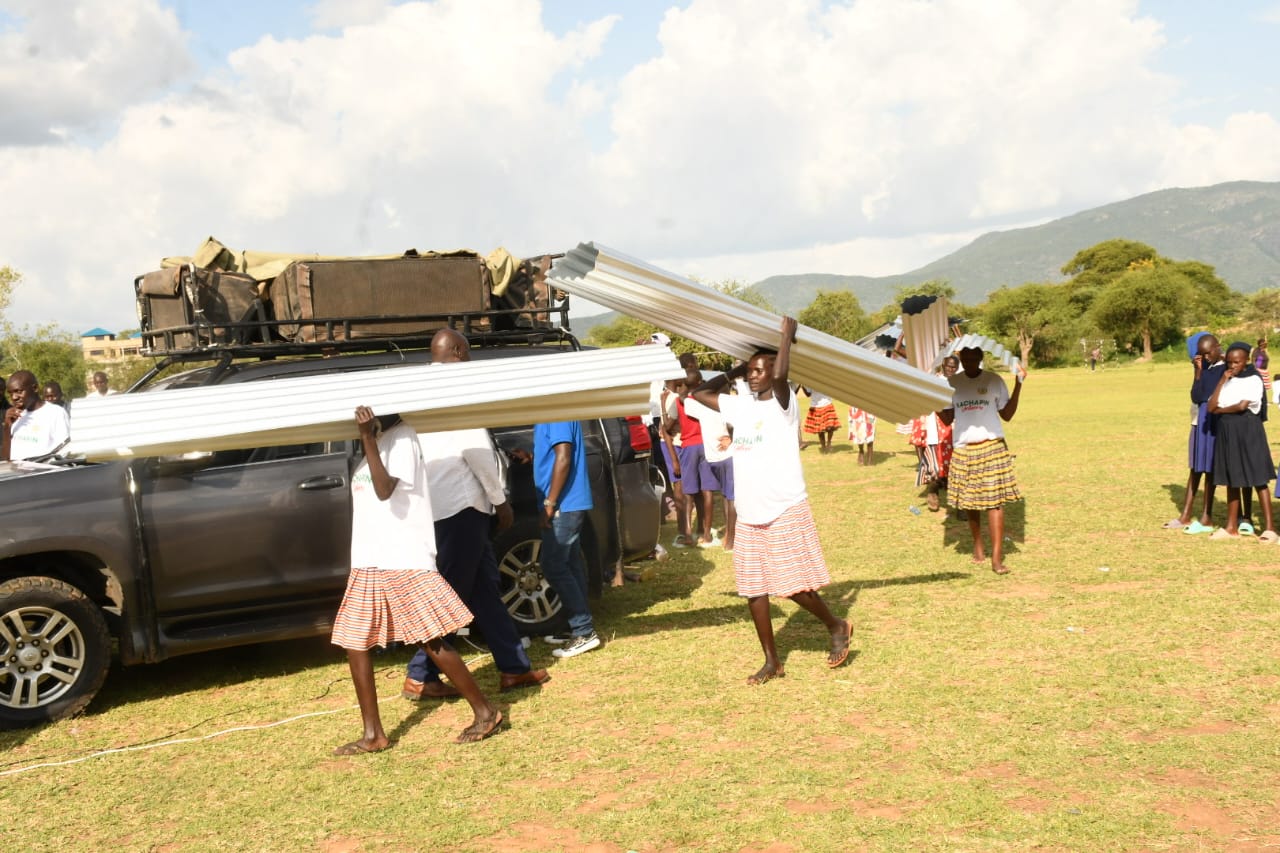
 Residents of West Pokot carrying away iron sheets distributed by Governor Simon Kachapin under a plan to upgrade rural homes/ MATHEWS NDANYI
Residents of West Pokot carrying away iron sheets distributed by Governor Simon Kachapin under a plan to upgrade rural homes/ MATHEWS NDANYI
Over 5,000 rural homes in West Pokot, where residents still live in grass-thatched houses, have been targeted for improvement, Governor Simon Kachapin has announced.
The transformative housing and energy project, dubbed the “Ondoa Nyasi initiative”, is a flagship programme aligned with the governor’s development manifesto, where he pledged to uplift the lives of vulnerable and low-income residents.
It also forms a key component of the West Pokot County Integrated Development Plan (CIDP). Kachapin said the project targets the replacement of traditional grass-thatched roofs – which remain common across many parts of the county – with modern iron sheet roofing.
“While grass thatching once reflected our community’s cultural identity, it now poses serious risks, including fire hazards, vulnerability to floods and exposure to extreme weather,” he said.
He emphasised that this transition represents more than just a structural change, terming it “an investment in safety, dignity and opportunity for families across West Pokot”.
“With mabati roofing, households will enjoy safer and healthier living conditions. These homes can support clean energy through solar lighting, harvest rainwater and offer better learning environments for our children,” he added.
The county government will work with development partners to distribute iron sheets and other construction materials to enable families to build better homes.
Some of the families received the materials during the official launch of the initiative at the governor’s office.
Expanding access to clean energy through Kosap
Two weeks earlier, Kachapin revealed that over 20,000 families would benefit from the Kenya Off-Grid Solar Access Project (Kosap), which aims to provide clean, reliable and affordable energy to underserved communities.
The county boss hosted officials from the Kenya Power Company and Kosap in a planning meeting for the official handover of the initiative to Hypertek Engineering, the project’s technical implementation partner.
West Pokot is among 14 counties benefiting from the Sh10 billion project launched earlier this year by President William Ruto.
“The initiative is already making a significant impact by enhancing access to clean, reliable and affordable energy across the county,” Kachapin said.
He added that institutions in the Health and Education sectors are also included in the programme.
So far, 31 health facilities and several schools across North Pokot, Pokot South, Pokot Central and West Pokot sub-counties have been solarised.
The project ensures uninterrupted power supply to critical services, including healthcare and education.
Lighting up homes and lives
Under the “Lighting Up Homes and Lives” component, over 16,500 households in West Pokot have received home solar systems, improving safety, security and quality of life.
In addition, 5,000 families have transitioned to cleaner cooking technologies through the adoption of improved cookstoves, reducing health risks and environmental impact.
“This life-changing component will especially benefit our women, who are primarily responsible for feeding our families. They will now cook using clean energy,” the governor noted.
Powering community infrastructure
The project also includes the solarisation of 33 boreholes in Pokot Central, Kipkomo and North Pokot, boosting access to safe and sustainable water sources in remote communities.
Further, the initiative focuses on building local capacity to ensure long-term sustainability. County staff are undergoing training in solar energy systems, project management and environmental conservation.
Kachapin reiterated his administration’s commitment to fostering strategic partnerships that deliver impactful services to the people of West Pokot.
“The successful implementation of Kosap shows the value of collaborative development and the power of clean energy to transform rural communities.
“West Pokot is firmly on the path toward clean, affordable and sustainable energy for all. We appreciate the continued support from our national and development partners in making this vision a reality,” he said.













